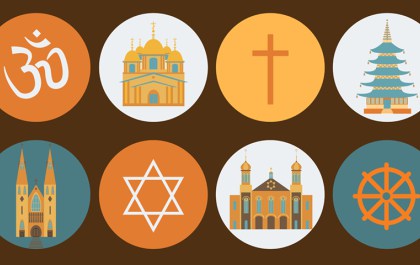News
31 августа 2017 года
Ethnic and religious diversity, tolerance cornerstone of new Kurdistan state

As Kurdistan gears toward statehood, one of the pillars of the new state is religious and ethnic diversity and tolerance.
With diversity across the Middle East, particularly in Iraq and Syria, on the decline, accelerated by the barbaric interpretation of Islam of the so-called Islamic State (IS), the Kurdistan of today is an island of tolerance and coexistence in a sea of violence against minorities.
When Kurdistan becomes the world’s newest state, the West should laud its cornerstone of secularism and ethno-social diversity that is rare, if non-existent, in the Middle East of today.
In a vibrant and cosmopolitan Western capital such as London, the sheer number of religions, cultures, ethnicities, and languages is remarkable.
London is dotted with various places of worships, stores that cater to almost all continents of the world, and communities that encompass nearly every country in the world. Most importantly, there is understanding, appreciation, and acceptance of its diverse population.
Erbil is no London, but in the perspective of a Middle East where thousands of Yezidis (Ezidis) and Christians were brutally slaughtered at the hands of IS, Kurdistan is a glimmer of hope that even in a volatile region such as the Middle East, coexistence of a vast mosaic of religions, social groupings, and ethnicities can prevail.
Judaism, Christianity, and Islam have been around for hundreds of years, with religions such as Zoroastrianism, Ezidism, and Yarsanism having a foothold in the region that spans even longer.
These religions have largely co-existed, not always peacefully, but with a degree of understanding and respect.
Some of the oldest Christian populations in the world reside in Kurdistan, and this is a testimony to Kurdistan’s tolerance that spans thousands of years.
The Middle East had a rich tapestry of civilizations, religions, and ethnicities, with all the Abrahamic religions, and some other popular religions, springing from this region.
Unfortunately, this has been altered by religious extremists and repressive governments to paint a one-sided picture of the region.
It is sometimes overlooked that the Jewish population of Iraq dwindled out only after the First World War and the Christian population, a symbolic part of Iraq and Kurdistan, only started migrating in droves after 2003 when sectarian violence dominated Baghdad after the downfall of Saddam Hussein.
Diversity in society is a quality to embrace, not curtail.
Firstly, there is no compulsion in religion or ethnic identity. For example, for centuries regional powers tried to assimilate or subjugate the Kurds forcefully and failed.
Secondly, there is a tremendous gain in understanding other religions, cultures, and ethnicities.
Underlying the diversity of Kurdistan, Islam, Christianity, Zoroastrianism, Yarasanism, Ezidism, Alevism, and Judaism have representatives in the Kurdistan Regional Government (KRG).
In fact, many religions, including Zoroastrianism, gained official recognition as beliefs as per Law No. 5 of Protecting Components of the Kurdistan Region.
The KRG has encouraged Christians, Ezidis, and Arabs to play a crucial part in the Kurdistan armed forces.
Participation in the military gives local forces more credibility and trust, whereas sectarian allegiance of Iraqi forces was one of the reasons IS was able to conquer large swaths of Iraq rapidly.
Kurdistan Region President Masoud Barzani previously emphasized an independent Kurdistan would have a multi-ethnic and multi-religious basis.
“We have a message of coexistence and fraternity,” President Barzani stressed. “We are not building a Kurdish nation state; we are building Kurdistan as a nation for non-Kurds as well, to be a homeland for all.”
President Barzani even stated his willingness to review the national anthem and flag to reflect the diverse Kurdistan landscape.
Mariwan Naqshbandi, a top official with Kurdistan’s Ministry of Endowment and Religious Affairs, previously told Kurdistan 24 an independent Kurdistan would be a beacon of peace in the region.
“When Kurdistan becomes an independent state, it will spread peace and stability in the Middle East and will be a model for other countries in the region, showing how people of all faiths and ethnic backgrounds can live in harmony,” he said.
While the KRG promises to guarantee ethnic and religious rights both now and as a future state, Baghdad has largely failed to protect its minorities.
The slaughter of thousands of Christians and other minorities, even before the atrocities under IS, is a stain on the new Iraq that was supposed to herald a new plural and liberal chapter after Hussein.
As for Western powers who continue to obstruct legitimate Kurdish rights to self-determination, do they prefer to see the slaughter of minorities, lack of tolerance, and extremism in the Middle East that is now manifesting on European streets?
Or, does the West support a state that preserves historic cultures, ethnicities, and religions and protects their values and beliefs?
Source: kurdistan24.net

